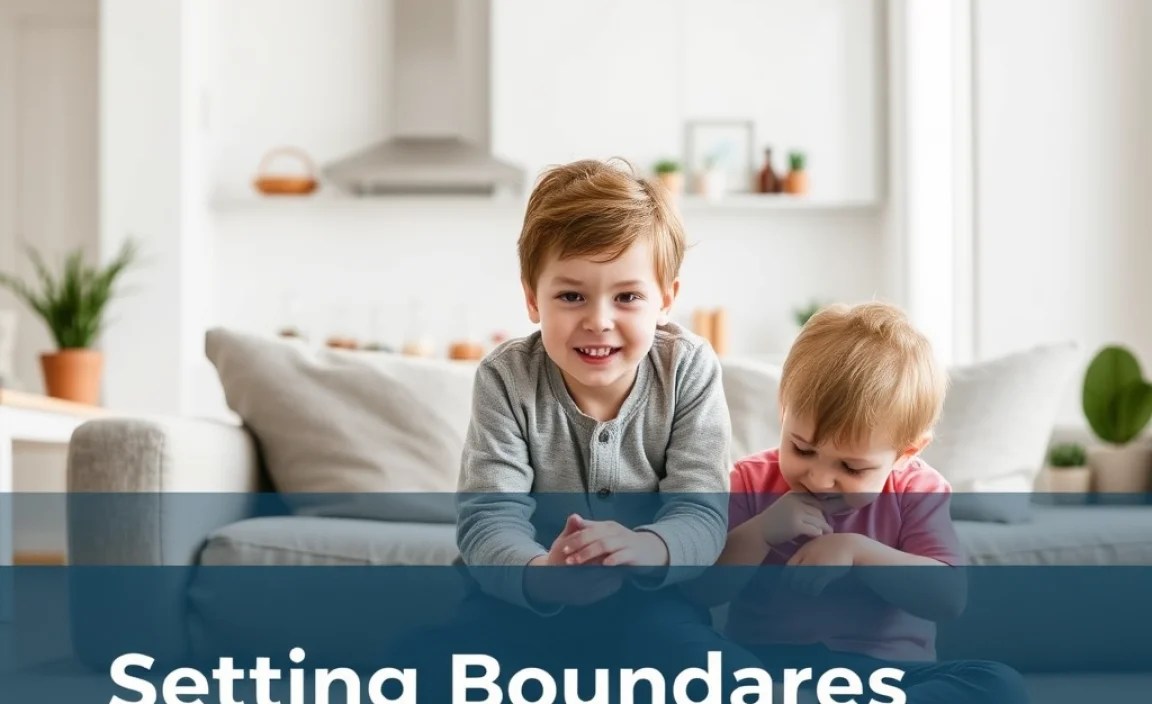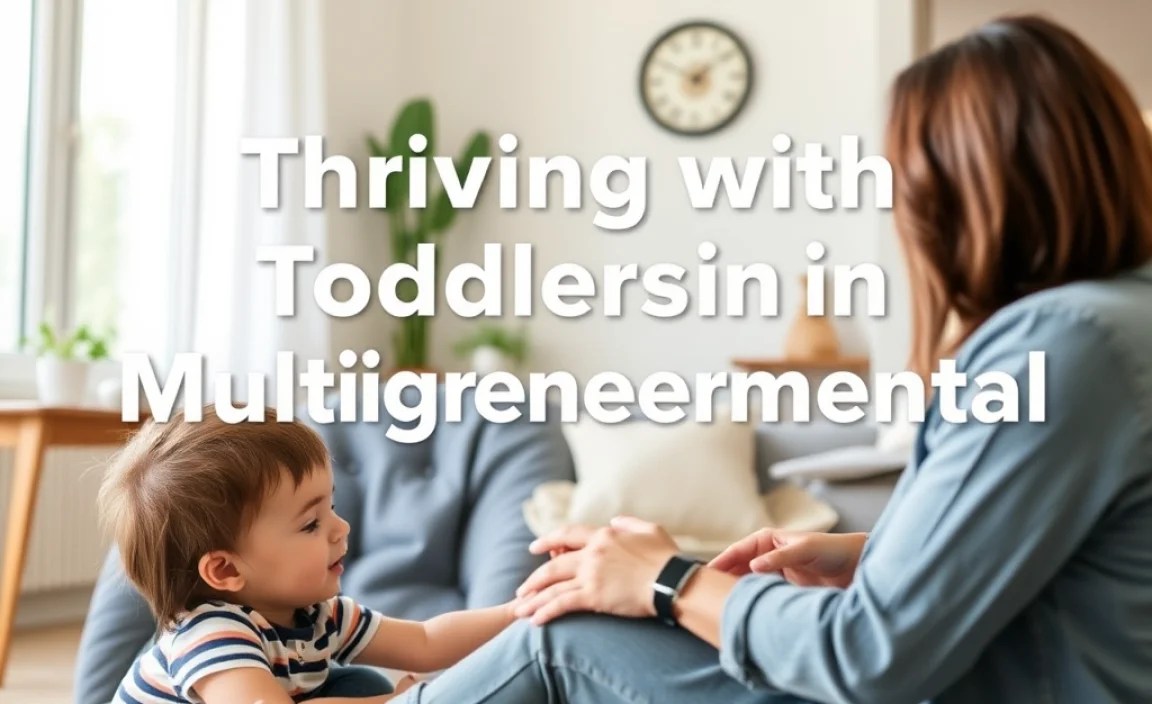Have you ever wondered what life is like in a home with toddlers and grandparents? Parenting toddlers in multigenerational homes can be both fun and challenging. Imagine a place where three generations share stories, meals, and chores. But how do parents manage with so many people in one house? Let’s explore some tips and tricks for making it work for everyone!
At A Glance
Key Takeaways
- Communication is key in multigenerational homes.
- Set clear boundaries for family harmony.
- Grandparents can offer invaluable help and wisdom.
- Parenting toddlers in multigenerational homes can strengthen family bonds.
- Respect and patience are vital for a happy home.
Benefits of Multigenerational Living

Living with multiple generations in one home offers unique benefits. Parents can get extra help from grandparents. Grandparents can share their wisdom and stories with toddlers. Kids learn about family history and traditions first-hand. Parents might feel less stressed with more hands on deck. Sharing chores also lightens the load for everyone.
- Extra help with childcare and chores.
- Strong family relationships and bonding.
- Opportunities to learn from older generations.
- Shared responsibilities among family members.
- More support during challenging parenting moments.
While living together, families must respect each other’s space. This helps maintain peace and happiness. It’s important to communicate clearly and ensure everyone’s needs are met. Multigenerational living can be a joyful experience with the right approach.
Fun Fact or Stats : About 64 million Americans live in multigenerational homes.
Stories From Multigenerational Homes
Imagine a house bustling with laughter and stories. Grandpa shares tales of his childhood while Grandma teaches a new recipe. These moments create cherished memories. In multigenerational homes, toddlers learn from older family members every day. They discover the importance of family and develop strong bonds. Isn’t that a beautiful way to grow up?
Why Families Choose This Lifestyle
Have you ever wondered why some families choose to live together? For many, it’s about support and connection. Living with grandparents can reduce parenting stress. In some cultures, it’s a tradition and a way to honor elders. For others, it’s a practical decision to share expenses. Whatever the reason, it creates a special environment for toddlers to thrive.
Navigating Challenges Together
Every home has challenges, and multigenerational ones are no different. It’s crucial to solve problems as a team. For instance, what happens if a toddler has different bedtime routines? Parents and grandparents must discuss and agree on the best approach. Sharing a home means adapting and understanding each other’s needs. Teamwork and flexibility ensure harmony in the household.
Setting Boundaries For Harmony

In any home, setting boundaries is essential, especially in multigenerational ones. Clear rules help everyone know what’s expected. For instance, certain times may be quiet hours. Toddlers might have specific nap schedules. Everyone must respect these boundaries for peace. Parents should communicate openly with grandparents about any concerns.
- Establish clear rules for shared spaces.
- Discuss child-rearing practices openly.
- Schedule family meetings to address issues.
- Encourage personal space and time for everyone.
- Foster a team spirit among family members.
When boundaries are respected, everyone feels valued and understood. It also prevents misunderstandings and conflicts. Remember, a happy home is one where everyone’s voice is heard and appreciated.
Fun Fact or Stats : Studies show that boundaries improve family relationships.
Creating Personal Spaces
Imagine having your special corner in a busy house. Personal spaces are vital for everyone, especially in multigenerational homes. These areas help people relax and recharge. For toddlers, it might be a cozy nook with toys. For grandparents, perhaps a quiet reading spot. Personal spaces ensure everyone’s comfort and happiness.
Listening to Each Other’s Needs
Ever felt like no one hears you? In big families, listening is key. Everyone has different opinions and preferences. Parents should encourage open conversations. When toddlers feel heard, they grow confident. Grandparents may have valuable advice from their own parenting days. Listening helps understand each other’s perspectives better.
Scheduling Regular Family Meetings
Family meetings can be fun! They’re a chance for everyone to share ideas and feelings. What if Grandpa wants to teach a new game? Or Grandma wants to plan a picnic? Discussing together strengthens family bonds. It’s also a time to address any issues. Meetings keep the household running smoothly and everyone happy.
Role of Grandparents in Toddlers’ Lives

Grandparents play a special role in toddlers’ lives. They offer love, guidance, and wisdom. Many toddlers look up to their grandparents as role models. Grandparents can share life lessons in fun ways. They tell stories, teach skills, and provide comfort. Parents can rely on them for support and advice.
- Teach family traditions and values.
- Share stories and life experiences.
- Provide extra care and attention.
- Assist with guidance and discipline.
- Help create a nurturing environment.
When grandparents are involved, toddlers feel more secure. They know there’s always someone to lean on. Grandparents’ love helps toddlers grow with confidence. Their presence brings warmth and happiness to the home.
Fun Fact or Stats : Over 70% of grandparents provide some form of childcare.
Sharing Stories and Traditions
Do you have a favorite family story? Grandparents are often the keepers of family tales. They share stories that teach lessons and entertain. Toddlers love hearing about the past and adventures. Traditions passed down by grandparents bring families closer. These stories are treasures that shape young minds.
Teaching Skills and Hobbies
Grandparents have many skills and hobbies to share. Maybe they know how to knit, cook, or garden. Teaching these skills can be a fun activity with toddlers. It’s also a great way to bond. Imagine a toddler learning to bake cookies with Grandma. Such moments create memories that last a lifetime.
Building Emotional Support Networks
Have you ever felt alone? In multigenerational homes, toddlers never feel that way. With grandparents around, there’s always emotional support. They offer comfort during tough times and celebrate happy moments. This support network helps children feel secure. It also strengthens family ties and understanding.
Common Challenges in Multigenerational Homes

Life in a multigenerational home is not always easy. Different generations may have different ways of doing things. Parents and grandparents might disagree on toddler care. Space and privacy can be issues too. Balancing everyone’s needs requires patience. Open communication helps solve most challenges.
- Different parenting styles can cause friction.
- Space and privacy may feel limited.
- Conflicting schedules need balancing.
- Sharing chores can be challenging.
- Cultural differences might arise.
Despite challenges, families can find solutions together. Understanding each other’s perspectives is vital. A family that communicates well can overcome any hurdle. Working as a team makes life smoother for everyone.
Fun Fact or Stats : 20% of Americans live in multigenerational homes.
Handling Different Parenting Styles
Imagine if two chefs had different recipes for the same dish. Similarly, parents and grandparents might have different parenting styles. It’s important to respect each other’s methods. Discuss and agree on rules for toddlers. This prevents confusion and ensures consistency. A united approach benefits the child’s development.
Finding Balance in Shared Spaces
Do you like having your own space? In busy homes, it can be tricky. Shared spaces need cooperation. Families should decide together how to use common areas. Maybe the living room is playtime central, but quiet in the evenings. Balancing needs helps everyone feel comfortable.
Resolving Conflicts Peacefully
Have you ever had a disagreement? In families, conflicts happen. It’s crucial to resolve them calmly. Listening and understanding each other’s points helps. Finding solutions together strengthens relationships. Parents and grandparents can lead by example, showing toddlers the power of teamwork.
Practical Tips for Parents

Parenting toddlers in multigenerational homes can be rewarding with the right tips. First, establish a routine that suits everyone. This helps toddlers know what to expect daily. Communication is crucial. Discuss needs and concerns openly with family members. Respect each other’s space and time. Gratitude goes a long way, so show appreciation often.
- Develop a routine together.
- Communicate needs and expectations clearly.
- Respect family members’ personal time.
- Show gratitude and appreciation.
- Encourage flexibility and compromise.
With these tips, family life becomes smoother and more enjoyable. Remember, a happy home is built on understanding and cooperation. Everyone plays a part in creating a positive atmosphere.
Fun Fact or Stats : Children with involved grandparents often do better in school.
Creating a Family Routine
Ever tried building a puzzle without a picture? A routine is like that picture. It helps families see the big picture and work together. Creating a schedule for meals, playtime, and rest can harmonize life. Toddlers thrive on routine, and families enjoy predictability. Together, decide what works best for everyone.
Encouraging Open Communication
Have you ever played the telephone game? Messages change when not communicated clearly. In families, clear communication avoids misunderstandings. Encourage everyone to speak openly and listen. This builds trust and strengthens relationships. It helps solve problems before they become big issues.
Practicing Gratitude and Appreciation
Have you ever received a thank-you note? It feels great, right? Showing gratitude boosts happiness in families. Appreciate the little things, like a meal cooked by Grandma or help from Grandpa. Thanking each other strengthens bonds and creates a positive environment. It reminds everyone they’re valued and loved.
Conclusion
Parenting toddlers in multigenerational homes is a unique journey. It combines the love and wisdom of different generations. Families that communicate well and respect each other create happy homes. Though there may be challenges, the rewards are worth it. Embrace the experience, and enjoy the strong family bonds it brings!
FAQs
Question: How can we manage different parenting styles?
Answer: Discuss approaches openly with grandparents. Agree on a consistent method together. This helps avoid confusion for toddlers. Sharing parenting tips can create a stronger bond. Understanding each other’s perspectives is key in multigenerational homes.
Question: What if space feels too crowded?
Answer: Create personal spaces for each family member. Decide together on areas for shared activities. Respect each other’s privacy and alone time. This ensures everyone feels comfortable. Personal spaces help maintain harmony.
Question: How do we resolve conflicts peacefully?
Answer: Encourage open communication and active listening. Find solutions together calmly. Respect each other’s viewpoints. Teamwork is essential for resolving issues. Set an example for toddlers through cooperation and understanding.
Question: What are the benefits of multigenerational living?
Answer: Families enjoy strong bonds and shared responsibilities. Grandparents offer wisdom and support. Toddlers learn family values and stories. Everyone gets more help in daily tasks. It’s a rewarding and enriching experience.
Question: How can we set effective boundaries?
Answer: Discuss and establish clear family rules. Schedule family meetings to address any concerns. Respect each other’s space and routines. Regular communication helps maintain harmony. Boundaries ensure everyone feels respected and valued.
Question: Why is routine important for toddlers?
Answer: Routines help toddlers feel secure and understand their day. They know what to expect, which reduces stress. A predictable schedule aids in development. It assists in setting good habits early on. Families benefit from a harmonious rhythm.

